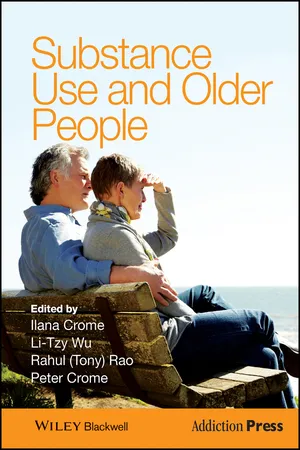
- English
- ePUB (mobile friendly)
- Available on iOS & Android
Substance Use and Older People
About this book
Substance use and addiction is an increasing problem amongst older people. The identification of this problem is often more difficult in older patients and is frequently missed, particularly in the primary care context and in emergency departments, but also in a range of medical and psychiatric specialties.
Substance Use and Older People shows how to recognise and treat substance problems in older patients. However, it goes well beyond assessment and diagnosis by incorporating up-to-date evidence on the management of those older people who are presenting with chronic complex disorders, which result from the problematic use of alcohol, inappropriate prescribed or over the counter medications, tobacco, or other drugs. It also examines a variety of biological and psychosocial approaches to the understanding of these issues in the older population and offers recommendations for policy.
Substance Use and Older People is a valuable resource for geriatricians, old age psychiatrists, addiction psychiatrists, primary care physicians, and gerontologists as well as policy makers, researchers, and educators. It is also relevant for residents and fellows training in geriatrics or geri-psychiatry, general practitioners and nursing home physicians.
Frequently asked questions
- Essential is ideal for learners and professionals who enjoy exploring a wide range of subjects. Access the Essential Library with 800,000+ trusted titles and best-sellers across business, personal growth, and the humanities. Includes unlimited reading time and Standard Read Aloud voice.
- Complete: Perfect for advanced learners and researchers needing full, unrestricted access. Unlock 1.4M+ books across hundreds of subjects, including academic and specialized titles. The Complete Plan also includes advanced features like Premium Read Aloud and Research Assistant.
Please note we cannot support devices running on iOS 13 and Android 7 or earlier. Learn more about using the app.
Information
Section 1
LEGAL AND ETHICAL ASPECTS OF CARE FOR OLDER PEOPLE WITH SUBSTANCE MISUSE
Chapter 1
NEGOTIATING CAPACITY AND CONSENT IN SUBSTANCE MISUSE
Introduction
Substance abuse and capacity
Mental capacity legislation
Mental Capacity Act 2005
- A person must be given all practicable help before anyone treats them as not being able to make their own decisions.
- A person is not to be treated as unable to make a decision merely because he makes an unwise decision.
- Anything done or any decision made under this Act for or on behalf of a person who lacks capacity must be done, or made, in his/her best interests.
- Anything done or decided for or on behalf of a person who lacks capacity should be the least restrictive of their basic rights and freedoms.
Capacity assessment
- Does the person have a general understanding of what decision they need to make and why they need to make it?
- Does the person have a general understanding of the likely consequences of making, or not making, this decision?
- Is the person able to understand, retain, use and weigh up the information relevant to this decision?
- Can the person communicate their decision (by talking, using sign language or any other means)? Would the services of a professional (such as a speech and language therapist) be helpful?
Capacity and unwise decisions
Table of contents
- COVER
- SERIES PAGE
- TITLE PAGE
- COPYRIGHT PAGE
- DEDICATION
- CONTRIBUTORS
- FOREWORD
- INTRODUCTION
- LIST OF ABBREVIATIONS
- Section 1: LEGAL AND ETHICAL ASPECTS OF CARE FOR OLDER PEOPLE WITH SUBSTANCE MISUSE
- Section 2: EPIDEMIOLOGY AND DEMOGRAPHY
- Section 3: LONGITUDINAL STUDIES OF AGEING AND SUBSTANCE ABUSE
- Section 4: COMPREHENSIVE GERIATRIC ASSESSMENT AND SPECIAL NEEDS OF OLDER PEOPLE
- Section 5: SCREENING AND INTERVENTION IN HEALTH CARE SETTINGS
- Section 6: USE OF SUBSTANCE ABUSE TREATMENT SERVICES AMONG OLDER ADULTS
- Section 7: AGE-SPECIFIC TREATMENT INTERVENTIONS AND OUTCOMES
- Section 8: POLICY: PROPOSALS FOR DEVELOPMENT
- INDEX
- END USER LICENSE AGREEMENT